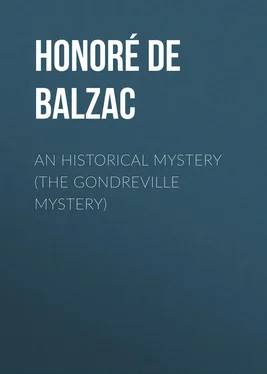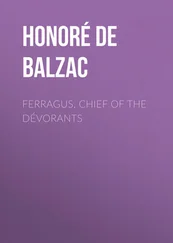Honoré Balzac - An Historical Mystery (The Gondreville Mystery)
Здесь есть возможность читать онлайн «Honoré Balzac - An Historical Mystery (The Gondreville Mystery)» — ознакомительный отрывок электронной книги совершенно бесплатно, а после прочтения отрывка купить полную версию. В некоторых случаях можно слушать аудио, скачать через торрент в формате fb2 и присутствует краткое содержание. Жанр: literature_19, foreign_antique, foreign_prose, на английском языке. Описание произведения, (предисловие) а так же отзывы посетителей доступны на портале библиотеки ЛибКат.
- Название:An Historical Mystery (The Gondreville Mystery)
- Автор:
- Жанр:
- Год:неизвестен
- ISBN:нет данных
- Рейтинг книги:3 / 5. Голосов: 1
-
Избранное:Добавить в избранное
- Отзывы:
-
Ваша оценка:
- 60
- 1
- 2
- 3
- 4
- 5
An Historical Mystery (The Gondreville Mystery): краткое содержание, описание и аннотация
Предлагаем к чтению аннотацию, описание, краткое содержание или предисловие (зависит от того, что написал сам автор книги «An Historical Mystery (The Gondreville Mystery)»). Если вы не нашли необходимую информацию о книге — напишите в комментариях, мы постараемся отыскать её.
An Historical Mystery (The Gondreville Mystery) — читать онлайн ознакомительный отрывок
Ниже представлен текст книги, разбитый по страницам. Система сохранения места последней прочитанной страницы, позволяет с удобством читать онлайн бесплатно книгу «An Historical Mystery (The Gondreville Mystery)», без необходимости каждый раз заново искать на чём Вы остановились. Поставьте закладку, и сможете в любой момент перейти на страницу, на которой закончили чтение.
Интервал:
Закладка:
The rond-point was the scene of the meet in the time of the “Grand Marquis” – a name given in the family to the Simeuse who built Gondreville. Since 1789 Michu lived in the hunting lodge at the entrance to the park, built in the reign of Louis XIV., and called the pavilion of Cinq-Cygne. The village of Cinq-Cygne is at the end of the forest of Nodesme (a corruption of Notre-Dame) which was reached through the fine avenue of four rows of elms where Michu’s dog was now suspecting spies. After the death of the Grand Marquis this pavilion fell into disuse. The vice-admiral preferred the court and the sea to Champagne, and his son gave the dilapidated building to Michu for a dwelling.
This noble structure is of brick, with vermiculated stone-work at the angles and on the casings of the doors and windows. On either side is a gateway of finely wrought iron, eaten with rust and connected by a railing, beyond which is a wide and deep ha-ha, full of vigorous trees, its parapets bristling with iron arabesques, the innumerable sharp points of which are a warning to evil-doers.
The park walls begin on each side of the circumference of the rond-point ; on the one hand the fine semi-circle is defined by slopes planted with elms; on the other, within the park, a corresponding half-circle is formed by groups of rare trees. The pavilion, therefore, stands at the centre of this round open space, which extends before it and behind it in the shape of two horseshoes. Michu had turned the rooms on the lower floor into a stable, a kitchen, and a wood-shed. The only trace remaining of their ancient splendor was an antechamber paved with marble in squares of black and white, which was entered on the park side through a door with small leaded panes, such as might still be seen at Versailles before Louis-Philippe turned that Chateau into an asylum for the glories of France. The pavilion is divided inside by an old staircase of worm-eaten wood, full of character, which leads to the first story. Above that is an immense garret. This venerable edifice is covered by one of those vast roofs with four sides, a ridgepole decorated with leaden ornaments, and a round projecting window on each side, such as Mansart very justly delighted in; for in France, the Italian attics and flat roofs are a folly against which our climate protests. Michu kept his fodder in this garret. That portion of the park which surrounds the old pavilion is English in style. A hundred feet from the house a former lake, now a mere pond well stocked with fish, makes known its vicinity as much by a thin mist rising above the tree-tops as by the croaking of a thousand frogs, toads, and other amphibious gossips who discourse at sunset. The time-worn look of everything, the deep silence of the woods, the long perspective of the avenue, the forest in the distance, the rusty iron-work, the masses of stone draped with velvet mosses, all made poetry of this old structure, which still exists.
At the moment when our history begins Michu was leaning against a mossy parapet on which he had laid his powder-horn, cap, handkerchief, screw-driver, and rags, – in fact, all the utensils needed for his suspicious occupation. His wife’s chair was against the wall beside the outer door of the house, above which could still be seen the arms of the Simeuse family, richly carved, with their noble motto, “Cy meurs.” The old mother, in peasant dress, had moved her chair in front of Madame Michu, so that the latter might put her feet upon the rungs and keep them from dampness.
“Where’s the boy?” said Michu to his wife.
“Round the pond; he is crazy about the frogs and the insects,” answered the mother.
Michu whistled in a way that made his hearers tremble. The rapidity with which his son ran up to him proved plainly enough the despotic power of the bailiff of Gondreville. Since 1789, but more especially since 1793, Michu had been well-nigh master of the property. The terror he inspired in his wife, his mother-in-law, a servant-lad named Gaucher, and the cook named Marianne, was shared throughout a neighborhood of twenty miles in circumference. It may be well to give, without further delay, the reasons for this fear, – all the more because an account of them will complete the moral portrait of the man.
The old Marquis de Simeuse transferred the greater part of his property in 1790; but, overtaken by circumstances, he had not been able to put the estate of Gondreville into sure hands. Accused of corresponding with the Duke of Brunswick and the Prince of Cobourg, the marquis and his wife were thrust into prison and condemned to death by the revolutionary tribunal of Troyes, of which Madame Michu’s father was then president. The fine domain of Gondreville was sold as national property. The head-keeper, to the horror of many, was present at the execution of the marquis and his wife in his capacity as president of the club of Jacobins at Arcis. Michu, the orphan son of a peasant, showered with benefactions by the marquise, who brought him up in her own home and gave him his place as keeper, was regarded as a Brutus by excited demagogues; but the people of the neighborhood ceased to recognize him after this act of base ingratitude. The purchaser of the estate was a man from Arcis named Marion, grandson of a former bailiff in the Simeuse family. This man, a lawyer before and after the Revolution, was afraid of the keeper; he made him his bailiff with a salary of three thousand francs, and gave him an interest in the sales of timber; Michu, who was thought to have some ten thousand francs of his own laid by, married the daughter of a tanner at Troyes, an apostle of the Revolution in that town, where he was president of the revolutionary tribunal. This tanner, a man of profound convictions, who resembled Saint-Just as to character, was afterwards mixed up in Baboeuf’s conspiracy and killed himself to escape execution. Marthe was the handsomest girl in Troyes. In spite of her shrinking modesty she had been forced by her formidable father to play the part of Goddess of Liberty in some republican ceremony.
The new proprietor came only three times to Gondreville in the course of seven years. His grandfather had been bailiff of the estate under the Simeuse family, and all Arcis took for granted that the citizen Marion was the secret representative of the present Marquis and his twin brother. As long as the Terror lasted, Michu, still bailiff of Gondreville, a devoted patriot, son-in-law of the president of the revolutionary tribunal of Troyes and flattered by Malin, representative from the department of the Aube, was the object of a certain sort of respect. But when the Mountain was overthrown and after his father-in-law committed suicide, he found himself a scape-goat; everybody hastened to accuse him, in common with his father-in-law, of acts to which, so far as he was concerned, he was a total stranger. The bailiff resented the injustice of the community; he stiffened his back and took an attitude of hostility. He talked boldly. But after the 18th Brumaire he maintained an unbroken silence, the philosophy of the strong; he struggled no longer against public opinion, and contented himself with attending to his own affairs, – wise conduct, which led his neighbors to pronounce him sly, for he owned, it was said, a fortune of not less than a hundred thousand francs in landed property. In the first place, he spent nothing; next, this property was legitimately acquired, partly from the inheritance of his father-in-law’s estate, and partly from the savings of six-thousand francs a year, the salary he derived from his place with its profits and emoluments. He had been bailiff of Gondreville for the last twelve years and every one had estimated the probable amount of his savings, so that when, after the Consulate was proclaimed, he bought a farm for fifty thousand francs, the suspicions attaching to his former opinions lessened, and the community of Arcis gave him credit for intending to recover himself in public estimation. Unfortunately, at the very moment when public opinion was condoning his past a foolish affair, envenomed by the gossip of the country-side, revived the latent and very general belief in the ferocity of his character.
Читать дальшеИнтервал:
Закладка:
Похожие книги на «An Historical Mystery (The Gondreville Mystery)»
Представляем Вашему вниманию похожие книги на «An Historical Mystery (The Gondreville Mystery)» списком для выбора. Мы отобрали схожую по названию и смыслу литературу в надежде предоставить читателям больше вариантов отыскать новые, интересные, ещё непрочитанные произведения.
Обсуждение, отзывы о книге «An Historical Mystery (The Gondreville Mystery)» и просто собственные мнения читателей. Оставьте ваши комментарии, напишите, что Вы думаете о произведении, его смысле или главных героях. Укажите что конкретно понравилось, а что нет, и почему Вы так считаете.












